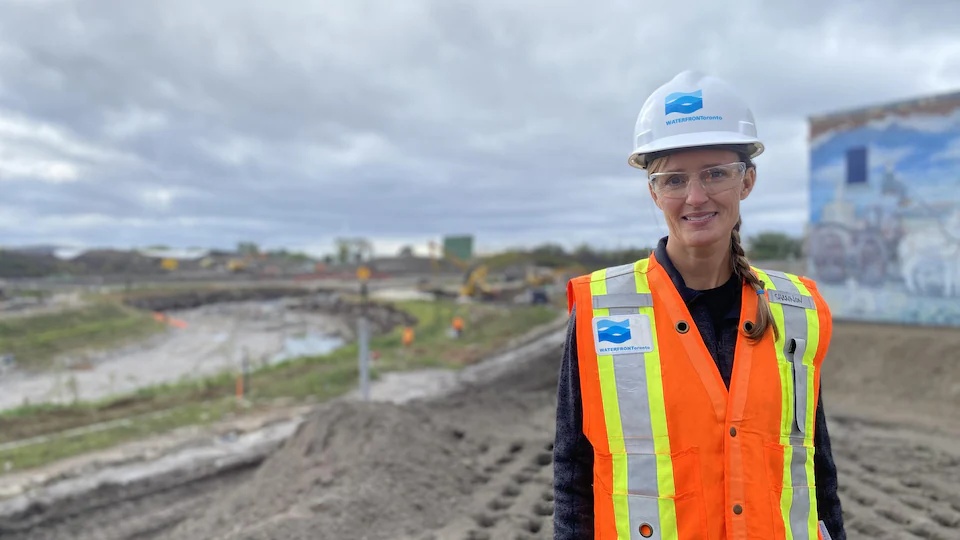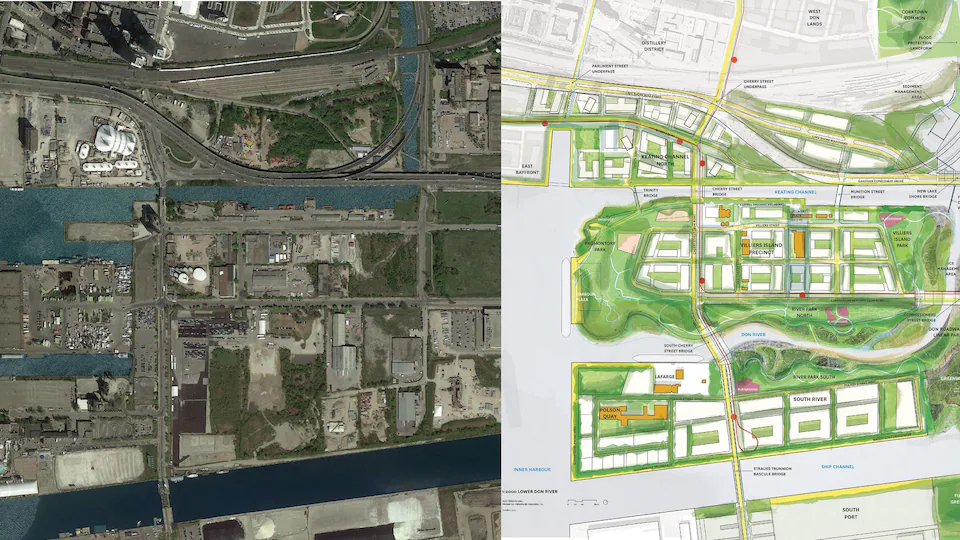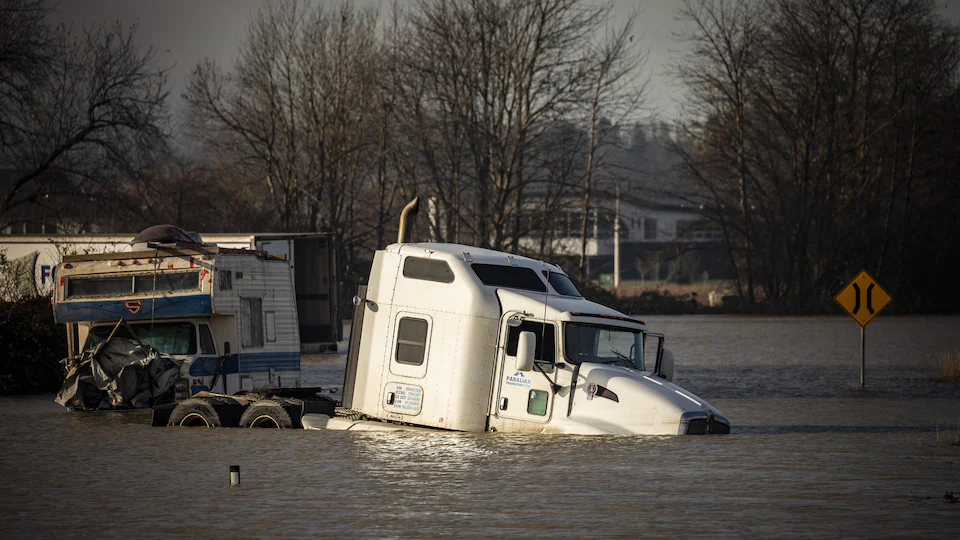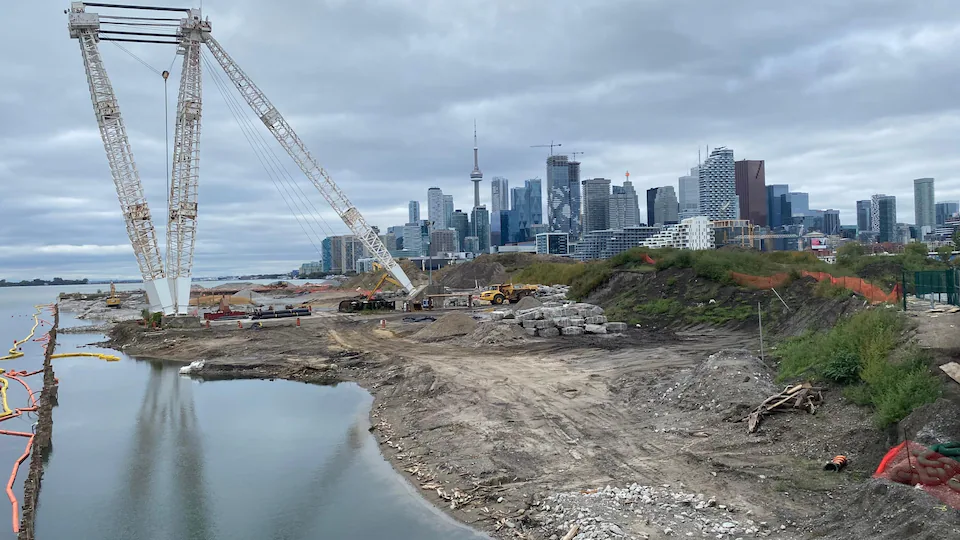With both feet in the mud, Shannon Baker gestures to the vast furrow behind her, where cranes and workers congregate.
The project manager for parks and public spaces at Waterfront Toronto says with a big smile what is being built there is a kilometer long river.
This river, which looks more like a canal, will be surrounded by restored gardens, swamps and wetlands. Overlays of tarpaulins, soil, vegetation, as well as the roots of large trees will be incorporated into their banks to make them more resistant to erosion.
It is a $1.25 billion project that will reorganize the estuary of the Don River into Port Lands in Toronto. When completed, it will protect 240 hectares of floodplain a 20-minute walk from the city center.
In terms of size, it is equivalent to a neighborhood that stretches from the CN Tower to the Eaton Center.
” By improving soil quality and installing more water gaps, […] The water will be able to flow into the lake, and will not overflow towards the east towards the residential areas. »
A transformation is already underway
This is a world-class example of climate change adaptation!
Says Elliott Capel, former president of the City of Toronto’s Resilience Division.
The territory of the port, which was built on a swamp, was very vulnerable to flooding, but there is no doubt, according to him, that this danger is increasing day by day.
On the other hand, there is the intensity and frequency of heavy rain events; On the other hand, there are different factors that lead to river flooding: Both are getting worse, he says.
As Head of Resilience, Mr. Capel was responsible for analyzing all climate related risks for Queen City.
Every time he talks about it, he sums up Toronto’s changing climate in the same way: hotter, wetter, more extreme.
This is also true at the national level.
Even assuming that the planet will be able to partially reduce carbon emissions in the next few years, climate experts predict that in major cities across the country, extreme heat days will be twice as frequent over the next 30 years as they were between 1976 and 2005.
Are cities ready for these changes?
” The first question is: Are we prepared to deal with what is happening now? The answer is clear no. »
Fiona just ravaged the east of the country. To the west, British Columbia last year experienced the deadliest heat wave in its history, followed by more costly floods.
Elliott Capel also notes, “If you grew up in Toronto, you wouldn’t have grown up with the fog we saw last year.”
Canada is catching up
Toronto was one of the first Canadian cities to adopt a climate change adaptation strategy in 2008. Since then dozens of municipalities have done the same.
study (A new window) Published last month by the Ontario Climate Risk Institute notes that of the 400 Ontario municipalities studied, half have adopted such a strategy. The authors note, however, that most did not have the means to fully implement it and that little follow-up was done.
Adaptation progress remains limited in Ontario
concludes this report.
It’s no different in the rest of the country, says Elliot Capel.
In some areas, such as floods, we have made progress, but this is not enough
he thinks.
Canada lags behind in resilience.
We are not necessarily internationally advanced
also judges Canadian Climate Institute researcher Julian Burke.
He notes that Ottawa has not yet launched its first national climate change strategy. The UK, for example, has had one since 2008, and updates it every five years.
Time is running out, according to a new report from Climate Canada.
Julian Burke stresses that costs associated with flooding, health expenditures related to air pollution or heat, and shortened life of roads and infrastructure due to the climate are already costly in Canada.
By 2025, we are talking about a loss of economic growth of $25 billion, which is about half of the growth [du PIB] for that year.
The promised publication of a first national strategy by January still gives him hope.
” We’re on the right track, it’s a good first step, this strategy [nationale]but it must be activated quickly. »
Encouraging success models
Julian Burke also believes that if Canada adjusts its course in terms of climate resilience, it will reap benefits. Too fast
.
According to the institute’s report, every dollar invested in such a measure avoids up to $13 or $15 in loss.
The researcher also cites an example that has already yielded results in Montreal: a project to map flood-prone areas using laser technology, led by the Montreal Metropolitan Society.
We clearly saw the difference between the 2017 and 2019 floods, when the municipality of Deux-Montagnes used this data to take action. […] He had almost no damage
He says.
As for the Portland project, it should be ready in 2024.

“Alcohol scholar. Twitter lover. Zombieaholic. Hipster-friendly coffee fanatic.”




